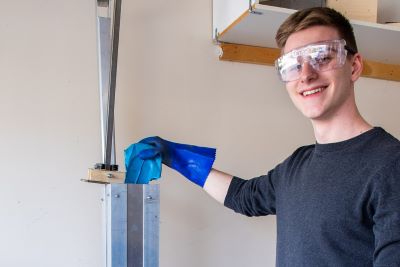Quebec’s startup incubators continue to drive innovation and commercialization
By Alex Navarre
.jpg) Dr. Alex Navarre, PhD (photo at right), is former director of McGill and Western Ontario’s offices of technology transfer, a former CEO of a French SATT (a technology transfer accelerator office), and a board member of Centre d’entreprises et d’innovation de Montréal (CEIM). This op-ed uses figures from CEIM that CEIM agreed to share publicly.
Dr. Alex Navarre, PhD (photo at right), is former director of McGill and Western Ontario’s offices of technology transfer, a former CEO of a French SATT (a technology transfer accelerator office), and a board member of Centre d’entreprises et d’innovation de Montréal (CEIM). This op-ed uses figures from CEIM that CEIM agreed to share publicly.
Incubation and acceleration refer to early-stage activities at the crossroads between the ideation and its translation towards a startup firm aimed at new products or services.
The terms generally imply at least an entrepreneur ready to lead the early steps of an emerging company. Often such occurrences arise when no immediate established adopter exists or is ready to assume the development risk, or when the entrepreneur-inventor behind the products or services decides to drive his/her own destiny.
History of incubation models
Startups are often considered to be a link towards technology dissemination, extending potential activities for large companies through later acquisitions of breakthrough technologies ahead of their mass market. As of the 1970s, companies such as Celanese, DuPont or Noranda were nurturing within their walls, or in related entities, the development of some of their long range or “out-of-core” business ventures.
In this way, these companies were providing some flexibility to their researchers in helping the proof-of-concept and even pilot stage developments of some of their promising inventions. They would then decide whether to integrate those developments in their product lines or spin them out.
In the early part of this century, incubation became more formalized in entities such as PARTEQ (Queen’s University), the incubators in the RTI Innovation Corridor of North Carolina universities, and Innocentre and CEIM (Centre d’entreprises et d’innovation de Montréal), both located in Quebec.
Such incubators offered an array of services, including office space and coaching during set time frames, generally up to three years. Governments soon after realized the economic importance of such entities for the development of startups and facilitated their funding. Acceleration became the latest buzzword to mean a shorter incubation period and time to market. Accelerators are thus providing both training and intensive coaching to their members.
In fact, startup creation has been far more prevalent as a percentage of reported university inventions in Canada than in the U.S. This is possibly due to the lack of receptors willing to assume the risk of developing new concepts.
Government programs were then designed to either finance partially the incubator’s operations and/or to subsidize high-risk early-stage projects through either proof-of-concept or partnership programs with industry.
Thus, in the early part of this century, North American universities started to initiate incubation and acceleration initiatives, having a stimulating effect notably in the life sciences and more recently in artificial intelligence applications. Canada currently has approximately 140 incubators and accelerators.
The Quebec incubation ecosystem
The Quebec experience is interesting since a few well-established incubators (Innocentre, Centech and CEIM) boast more than 20 years of experience. However, in the past decade a flurry of new ventures emerged, bringing the number of incubators to almost 70 and compelling the provincial government to select about 10 incubators that government would fund based on their performance.
Some are conventional incubators with or without walls, some provide intensive training or personalized coaching, and others are specialized, like CQIB (a life sciences incubator) in biotech. There are also regional incubators such as ACET connected with the Université de Sherbrooke.
Alliances have emerged, such as Centech in Montreal with the French IncubAlliance deeptech incubator in Paris-Saclay, or like CEIM with an early-stage Société d’Investissement Jeunesse (S.I.J.) fund.
A major early-stage publicly funded initiative, Axelys, just announced a partnership with three Quebec incubators, 2 Degrés, Centech and Quantino. Axelys, through a team of specialized professionals, offers tech transfer, coaching and early-stage financing to all publicly funded research institutions in Quebec.
In addition, conscious of the potential for international synergies, the Quebec government recently created a provincial incubating initiative aimed at high-growth startups. Capitalizing on Quebec universities’ quality research as a source of breakthrough inventions, Ax-C, a world-class entrepreneurial innovation space in Montreal was announced a few months ago, endowed with considerable support and resources mainly from the Quebec Ministry of Economy, Innovation and Energy.
Ax-C’s raison d’être is to encourage local early-stage ventures to attain their full potential and become “gazelles” (a high-growth company that has been increasing its revenues by at least 20 per cent annually for four years or more, starting from a revenue base of at least $100,000). This initiative came as a response to mounting concerns over foreign takeovers as well as exodus of early-stage ventures, such as Element AI, one of the Montreal-based gazelles that was the object of a foreign acquisition in 2020.
Success factors and performance
Few incubators, other than those related to universities, are catering to TRL (Technology Readiness Level) lower than three, which is analytical and experimental critical function and/or proof of concept. So are incubators taking enough of a risk?
In September 2023, CEIM carried out a longitudinal survey among its 345 incubated startups during the last 18 years. They found that the survival rate was 76 per cent over the period.
Only 83 companies had disappeared, while 22 were the object of a merger or acquisition. Revenues from those companies were more than $650 million in 2023, employing in excess of 5,000 people whose average salary was $65,000 (not adjusted in constant dollars).
CEIM’s survey reported annual returns from those incubated companies, after 18 years on a cumulative basis, to federal and provincial treasuries of about $140 million in 2021, thus making incubator subsidies a rather sound public investment.
In fact, on the basis of such a record, one might ask whether more public investment should be made available to reputable Canadian incubators. It would thus allow a higher risk tolerance in those early stages and increase the number of potential gazelles.
While funding may be an important issue to hire qualified coaches and to conduct enabling activities in support of startup management, identifying a first client is often the key to a startup’s survival. For incubated companies, the experience and contacts of the coaches is paramount. Many programs and consultants exist in this domain, making it difficult for startups to determine the right fit – another advantage provided by incubators.
All levels of governments could further help by sponsoring through their acquisition activities a first contract that would be exempt from the usual request-for-proposal requirements, for qualified incubated companies.
Since startups are an essential part of the innovation ecosystem and incubators contribute to increase their survival potential as well as to reduce the critical time to market for their output, our publicly funded research institutions should reinforce these incubation services by establishing appropriate partnerships.
In addition, programs such as Innovative Solutions Canada should recognize the strategic value provided by incubators and accelerators across Canada and take advantage of such networks to channel their support programs to startups, including funding to secure a first customer.
R$
Events For Leaders in
Science, Tech, Innovation, and Policy
Discuss and learn from those in the know at our virtual and in-person events.
See Upcoming Events
You have 0 free articles remaining.
Don't miss out - start your free trial today.
Start your FREE trial Already a member? Log in
By using this website, you agree to our use of cookies. We use cookies to provide you with a great experience and to help our website run effectively in accordance with our Privacy Policy and Terms of Service.





